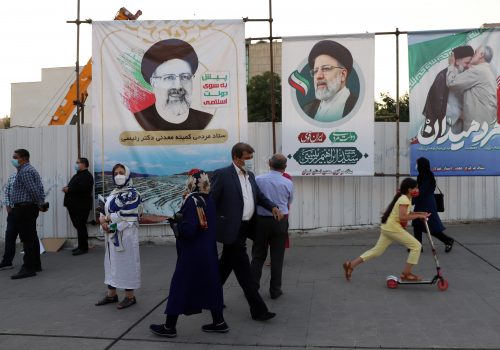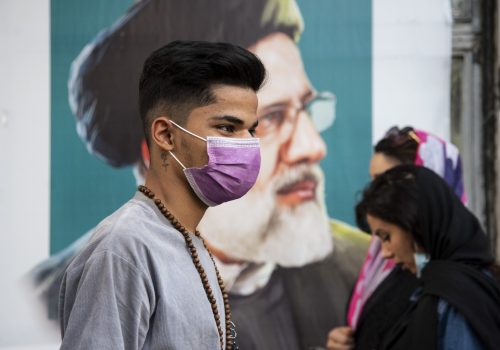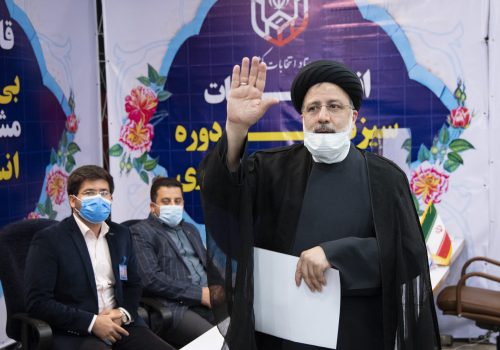An uncertain future for Iran under a minority president
On June 21, 2021, the Atlantic Council’s Future of Iran Initiative hosted an event to discuss the implications of Iran’s June 18 presidential elections for US-Iran relations, the 2015 nuclear deal, and Iran’s regional and domestic politics, including the succession to Supreme Leader Ayatollah Ali Khamenei. The panelists were: Borzou Daragahi, nonresident senior fellow at the Atlantic Council; Fatemeh Haghighatjoo, director of the Nonviolent Initiative for Democracy and former member of the Iranian parliament; Azadeh Zamirirad, Iran researcher and deputy head of the Africa and Middle East Division at the German Institute for International and Security Affairs; and Sadegh Zibakalam, author and professor at Tehran University. Barbara Slavin, director of the Future of Iran Initiative at the Atlantic Council, moderated the event.
Key takeaways from the event
- President-Elect Ebrahim Raisi is a loyalist, explained Daragahi, stating that [Raisi] “will do what the Supreme Leader says.”
- Zamirirad said that Raisi ascending from the presidency to succeed the Supreme Leader is not a given. Zamirirad explained that in the past thirty years, being president of Iran has not been positive for political careers, as former Iranian presidents have found themselves ostracized and marginalized.
- Daragahi believes that Raisi is more of a “placeholder” rather than a “presumed heir” as Supreme Leader. Ayatollah Khameini’s son, Mojtaba, is also a contender.
- According to official figures, half of the Iranian electorate did not take part in the election (official turnout was 48.8 percent).
- Zamirirad noted that because Raisi is coming from a non-politician background, having spent four decades in the Iranian judiciary, his inexperience as a politician will be a barrier to his success.
- Zamirirad and Zibakalam both said that the actual winners of the election were those who boycotted it. The historically-low voter turnout showed the establishment the extent of Iranian grievances which, Zamirirad said, “cannot be ignored.” However, none of the speakers could predict what form Iranian opposition protests would take. Zibakalam warned against violence, saying it would be like jumping from the “frying pan into the fire.” Zamirirad said that what was lacking in the Iranian opposition was “cross-class and cross-ethnic solidarity.”
- Zibakalam noted that the turnout in urban areas was even lower than the 48.8 percent nationwide and was, in some cases, only a third of the electorate.
- Raisi in his first press conference, blamed the COVID-19 pandemic and incumbent President Hassan Rouhani’s failings for the low turnout.
- Haghighatjoo said the major reason for low turnout was the lack of real competition. The Supreme Leader paved the way for Raisi to win by disqualifying any plausible competitors. She said that if Iranian elections in the future were competitive, there would be higher turnout.
President-elect Raisi’s approach to US-Iran relations, the nuclear deal, and nuclear capabilities
- Raisi said at his first press conference on June 21 that he would not meet with US President Joe Biden even if the Joint Comprehensive Plan of Action (JCPOA) is restored. However, Zamirirad and other speakers said Raisi will support a return to the JCPOA to achieve sanctions relief. In any case, it is not his decision to make.
- Zamirirad said she was concerned about implementation of the JCPOA and that it might be more difficult under Raisi than under Rouhani—the latter of whom viewed the nuclear deal as a cornerstone of his administration. In particular, she warned that Iran might reduce cooperation with the International Atomic Energy Agency.
- Daragahi said that the former Donald Trump administration’s policy of “maximum pressure” had failed and led to a sense of “arrogance” within the Iranian leadership. Despite all Iran has endured, Trump is gone and so is Israeli Prime Minister Benjamin Netanyahu. Therefore, Daragahi believes that the US will have to deal with a more “confident” Iran.
- All four panelists were asked to comment on Iran’s nuclear capabilities and whether Iran would ever actually produce nuclear bombs. Zibakalam said there is some support within Iran for nuclear weapons as a deterrent to foreign aggression. Zamirirad said that it is unlikely that Iran can conduct a clandestine nuclear program given Israeli penetration of the program. She said that Iran has already achieved a measure of deterrence merely by achieving the capability to build a bomb if it chooses. Daragahi and Haghighatjoo both believe that Iran will not produce a nuclear bomb.
President-elect Raisi’s domestic and international challenges
- Zamirirad said that despite the apparent consolidation of power by conservatives, Raisi will still face a divided conservative camp and a new generation of “revolutionaries.”
- Zibakalam said this consolidation by conservatives was a “blessing in disguise” for the opposition because Iranians now have no one else to blame for the problems in the country.
- When asked about Raisi’s policies toward ethnic and religious minorities, Haghighatjoo said the Raisi administration will most likely give some mid-tier positions to minority groups, such as the Kurds and other Sunnis, as well as constructing a few Sunni mosques, but these concessions will only be cosmetic.
- Zamirirad said that it was not clear whether Iran would obtain formal membership in the Shanghai Cooperation Organization because of differences among current members, including Russia and China. But she noted that Iran has been focusing on Asia for economic ties and that the trend would continue.
- When asked about Iran’s relations with Afghanistan, Daragahi said Iran and Turkey both seek a peaceful transition of power because they do not want millions more refugees flooding into their countries.
- Haghighatjoo believes that relations between Iran and Saudi Arabia will improve as both nations realize that they must work together to achieve common goals. However, she says that tensions between the two regional superpowers will persist.
Hezha Barzani is an intern with Middle East Programs
Image: Iranian Presidential candidate Ebrahim Raisi speaks during a campaign meeting at the Mosalla mosque in Tehran, Iran, May 16, 2017. Picture taken May 16, 2017. TIMA via REUTERS ATTENTION EDITORS - THIS IMAGE WAS PROVIDED BY A THIRD PARTY. FOR EDITORIAL USE ONLY.


